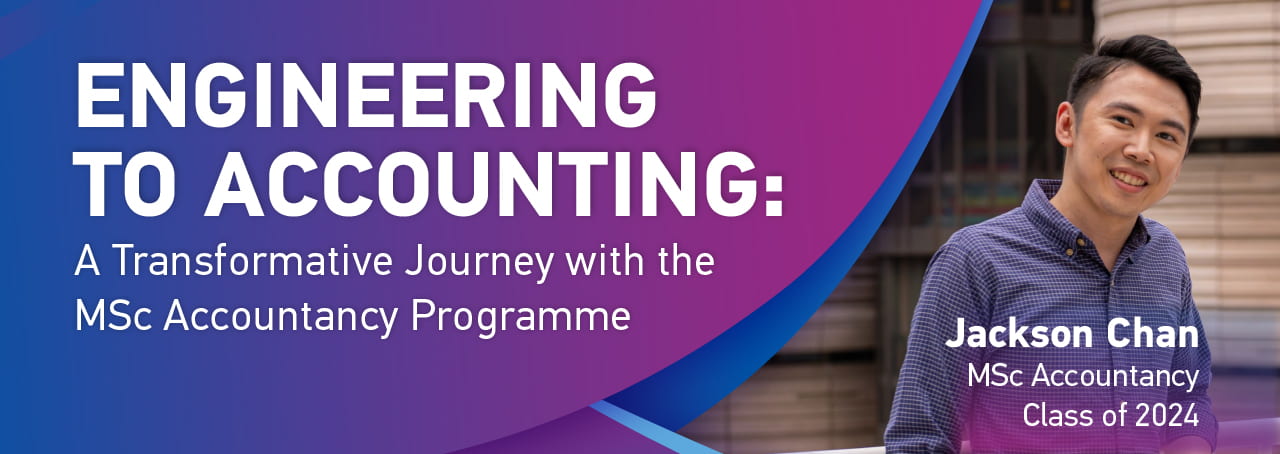Graduate Studies Blog

MSC ACCOUNTANCY
Engineering to Accounting: A Transformative Journey with the MSc Accountancy Programme
Far from mundane number-crunching, today’s accounting industry is changing at lightning speed. Novel technologies like AI are unleashing new ways to transform financial data into business insights. As the world moves towards achieving net-zero, accountants also play a key role in shaping the future through sustainability reporting.
The evolving role of the accountant is fascinating to Jackson Chan, a current participant in Nanyang Business School’s (NBS) MSc in Accountancy (MACC) programme. “Financial reporting standards are always improving – for instance, companies are now called upon to comply with zero-emission standards,” he says. “Accountants have a strategic part to play in this.”
Jackson’s path to accountancy is somewhat unusual – he was a mechanical engineer for almost three years. Here, he tells us why he is making a career pivot, and how the MACC programme is helping him unlock new opportunities.
From engineering to accountancy
As an undergraduate, Jackson majored in Mechanical Engineering before going on to his first job as a display engineer. However, he never lost sight of his interest in numbers.
“I realised I was keen on acquiring knowledge about numbers and financial analysis,” he reflects. “I wanted to broaden my skillsets and keep learning new things such as accounting capabilities, to adapt in this ever-changing world.”
Jackson’s interest in a career change grew when he took the plunge to join a firm that offered accounting and financial reporting services. Being immersed in financial statements gave him new perspectives and the confidence to pull off a career change.
“Accounting is like solving a puzzle to turn numbers into meaningful insights and recommendations,” he explains. “Through accountancy, I could also gain comprehensive skillsets for my future career – from financial management to corporate tax, transfer pricing, investments, contract law, corporate assets knowledge, and even some HR management along the way.”
A programme with strong industry relevance
Although Jackson is just beginning a career change, he has big goals in mind. One of them is to manage accounting for a multinational corporation. He recognised the need for an MSc Accountancy programme with real-world relevance and globally recognised accreditation.

The NBS curriculum stood out with its strong industry connections. Selected modules are conceptualised and co-taught with experts from the Big Four accounting firms, enabling participants to link classroom learnings to real-world business problems. “The programme is globally accredited and has a very good reputation in the field of accountancy and finance,” he adds.

The NBS curriculum stood out with its strong industry connections. Selected modules are conceptualised and co-taught with experts from the Big Four accounting firms, enabling participants to link classroom learnings to real-world business problems. “The programme is globally accredited and has a very good reputation in the field of accountancy and finance,” he adds.
Given his non-finance background, Jackson was prepared for a tough transition into the world of accountancy. “I have to put in great effort to catch up in all areas of accountancy, particularly topics like financial accounting, whereas my peers may already be familiar with things like formatting financial statements and reporting structures,” he says.
To help participants like Jackson bridge any gaps in knowledge, the MACC programme offers preparatory courses before the start of the academic year. “Luckily, I had strong support from the programme which offered the opportunity to attend Harvard Business Publishing Education’s online course, enabling me to brush up on the basics of accounting.”
Problem-solving in a global context
Only a month into classes, Jackson can already attest that his experience has been “very insightful”. The MACC cohort is a diverse one, comprising over 90% international participants. He shared that his interactions with coursemates have enriched his understanding of the global business landscape – an understanding that will be crucial for his dream of joining a multinational corporation.
“There’s a lot of groupwork required in accounting,” he says. “Being part of an international team enables me to hone my problem-solving skills, with synergy from the different skillsets and viewpoints of each of our team members.”
Outside the classroom, he’s had opportunities to get to know his coursemates better through activities, such as during the orientation week. “We had fun team bonding activities with our fellow coursemates, ending off with the MSc Graduate Social evening where we made new friends and enjoyed good food together!”
While it is early days in the programme, Jackson is already looking forward to the rigorous curriculum ahead. “I’m quite excited for the Tax Management module, which will be highly relevant for understanding how tax regulations impact businesses. Company Law is another module that sounds interesting – we’ll learn about corporate governance and how companies are managed and controlled.”
A stepping stone to a global career
As technology transforms accounting, the role of the accountant is shifting from traditional compliance to strategic insights. For Jackson, the prospect of delivering greater value to businesses is inspiring. “I hope to contribute effectively to the finance industry and make a positive impact in the broader context,” he tells us.
Once he graduates next year, he believes that many doors will be open to him – both locally and globally.
“The MACC programme at NBS is well-accredited, with a direct pathway to the Singapore Chartered Accountant Qualification and strong links to professional bodies like ACCA,” he says. “This will be very useful in upskilling and gaining new perspectives, even after I graduate from NBS.”

